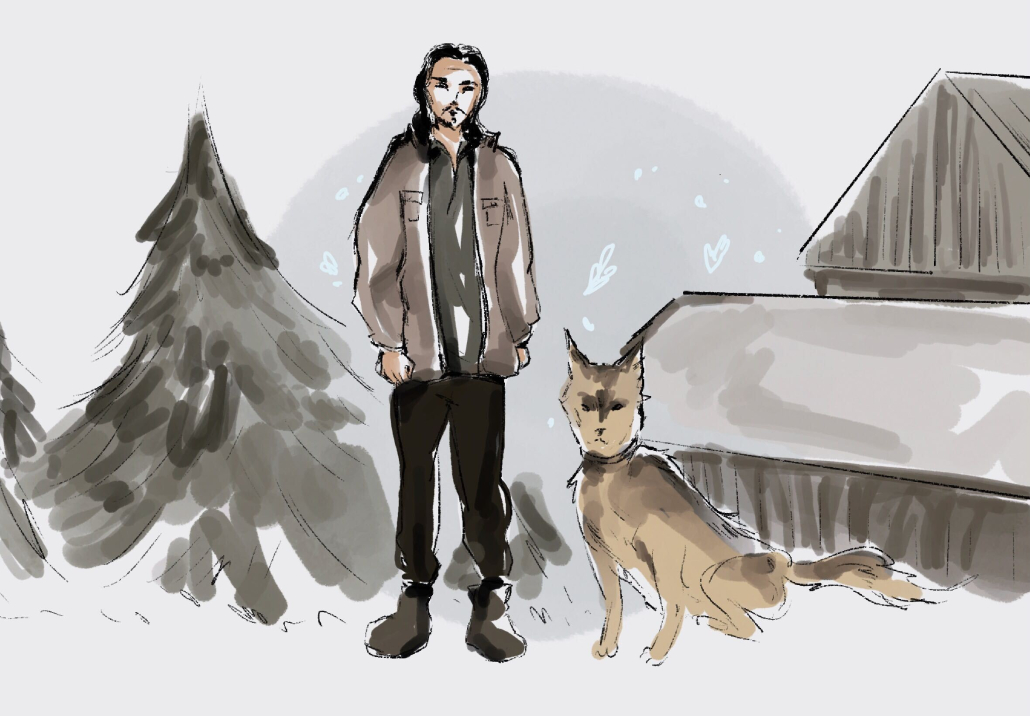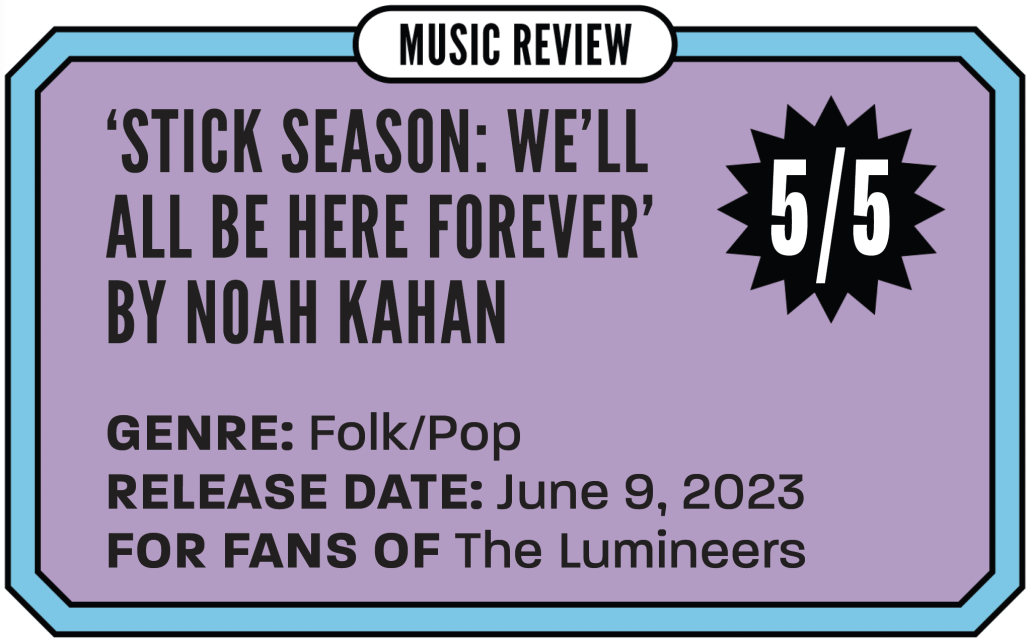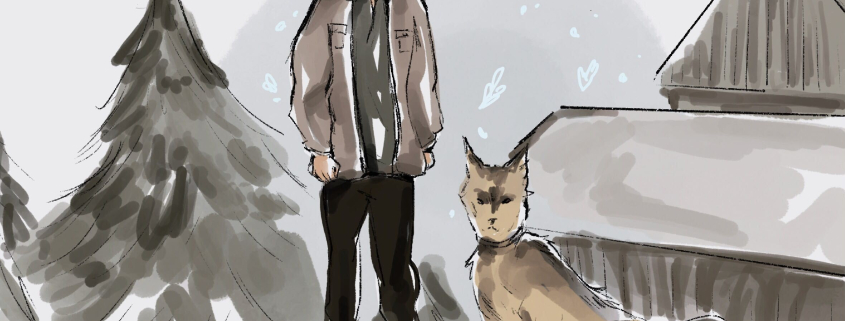REVIEW: ‘We’ll All Be Here Forever’ is Kahan’s latest masterpiece


Whether or not one is a Vermonter familiar with vibrant autumn leaves and barren winter branches, listening to Noah Kahan’s extended version of 2022 album “Stick Season” will undoubtedly transport its listeners to an eerily tranquil small town. “Stick Season (We’ll All Be Here Forever)” released June 9, expands on the heartfelt album with seven new tracks.
“Stick season,” a term mostly used in rural New England, refers to the time between fall and winter — a desolate bridge between the seasons in which the leaves are gone from the trees, but there is not yet snowfall. Shedding leaves, moving on and reflecting on people that have dwindled into vacant memories characterizes Kahan’s recent deluxe album.
Kahan portrays his hometown of Strafford, Vermont — where he continues to live today — as bleak and buried in lost potential. Yet he sets himself as the center of it all. The axis his world turns on is his small town that he will never leave. He sees leaving as a victory that he will only ever witness and never experience.
“‘Stick Season’ is a record that at times is full of bitterness and resentment towards those who left a place that the narrator could not,” on a social media post Kahan wrote. “What if the deluxe is about letting go of that resentment, and finding peace in sticking around?”
“Dial Drunk’’ was easily the most anticipated song on the deluxe version after being teased on TikTok last month. The 37-second clip garnered 4.7 million views as the song’s candid lyrics resonated with Kahan’s growing audience that hung on to his every word. Each song on the deluxe album was meant to be a continuation of the 2022 album, and “Dial Drunk ‘’ carried on that torch beautifully. The acoustic strumming in the intro and Kahan’s signature vocal runs swept away the painfully written chorus: “It rang and rang, even the cops thought you were wrong for hanging up / I dial drunk, I die a drunk, I’d die for you.”
“Dial Drunk” is a song about relying on someone who doesn’t want to fill that role anymore. The need to lean on someone who isn’t around highlights an emotional blindspot that becomes clearer under the influence.
“We’ll All Be Here Forever” is filled with run-on sentences and the stream-of-consciousness songwriting Kahan is known for. With each song, it becomes more evident that Kahan is not delivering a certain message to his audience, but rather allowing them to listen in as he thinks out loud.
The deluxe album also includes an extended version of the song “The View Between Villages” that was on the original “Stick Season” record. This version includes two monologues from Strafford locals speaking on their love for the small town that is home to them.
The voices of Hazel Lewis and Melvin Coburn can be heard in the bridge of this song. “I found a town big enough for anything that I want / I mean, I’m not a city girl, ha-ha-ha, by any means,” Lewis says. While these are not names you see making national headlines, they are known in Strafford as hometown heroes and are honored in Kahan’s latest music for this.
Kahan also delves into his own mental health struggles in the extended album, just as he did in the original. Kahan candidly admitted on TikTok to not taking his antidepressant medication while he was recording the extra songs in hopes of finding artistic inspiration. In “No Complaints,” Kahan sings, “I filled the hole in my head with prescription medication / Then forgot how to cry, who am I, who am I to complain?”
Kahan continues his mental health advocacy outside of songwriting. Last month, he announced The Busyhead Project, which shares its name with his first studio album and serves as a platform to “increase mental health awareness, amplify discussion, and democratize resources.” Kahan donates a percentage of ticket sales to mental health organizations such as Bring Change to Mind.
Another song Kahan wrote on the deluxe album that explores mental health and suicide was the heartfelt “Call Your Mom.” In it, he sings, “Don’t let this darkness fool you / All lights turned off can be turned on / I’ll drive, I’ll drive all night / I’ll call your mom.” Kahan delivers the song with a frail delicacy in his tone. The rare ability to sing to millions of people but never allow them to feel lost in the crowd is a special talent of Kahan’s.
Packing bags, sorting through memories and carrying the guilt of leaving a place you love is unpacked in “You’re Gonna Go Far.” The song’s motif might speak to college students who’ve experienced the complicated, sometimes wrenching process of moving away from home for school.
Kahan sings, “So, pack up your car, put a hand on your heart / Say whatever you feel, be wherever you are / We ain’t angry at you, love / You’re the greatest thing we’ve lost,” acknowledging this idea of moving on from a place you don’t necessarily want to leave and grappling between being indebted to others and oneself. In “You’re Gonna Go Far,” Kahan grants listeners permission to do whatever is best for them.
Kahan’s latest work recognizes the shame of knowing you’re willingly walking away from people that don’t want you to go — of acknowledging that leaving home means looking for something more.
In a social media post, Kahan further explains the dichotomy between returning home yet not knowing your place. “Stick Season (We’ll All Be Here Forever)” is an album of relentless wandering in the process of self discovery.
“I went home,” he writes. “I had made a record about home so maybe that would be the place where I turned things around found inspiration again. Instead, I felt like a tourist. My home no longer felt like a secret or sanctuary but a reminder of the impending failure of whatever I did next. I was now truly and wholly lost.”

